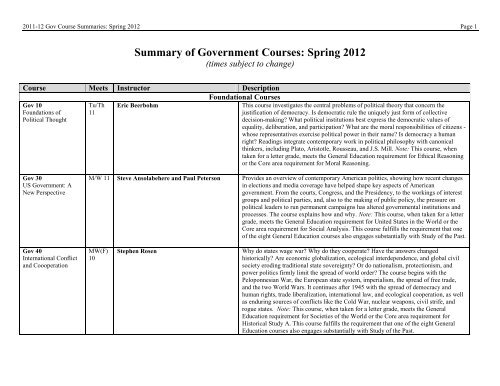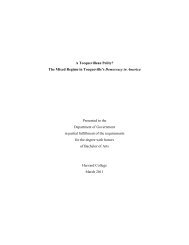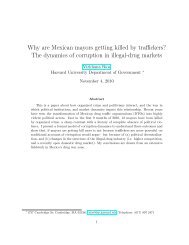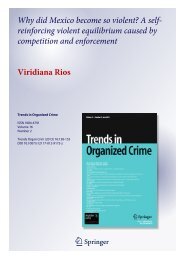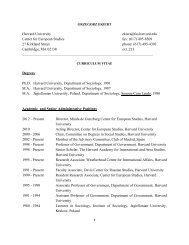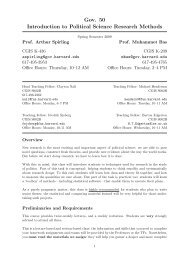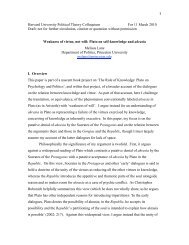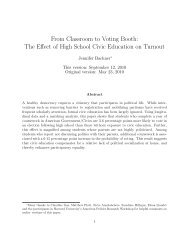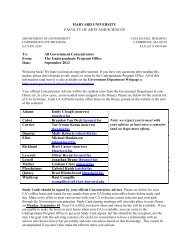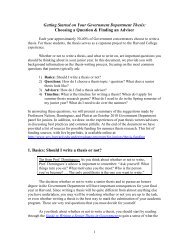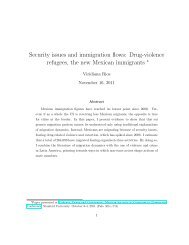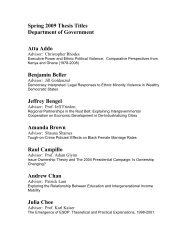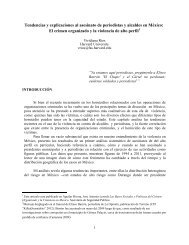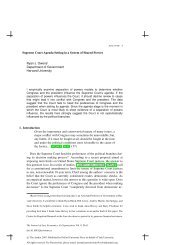2008-09 Gov Courses Cheat Sheet - Department of Government
2008-09 Gov Courses Cheat Sheet - Department of Government
2008-09 Gov Courses Cheat Sheet - Department of Government
Create successful ePaper yourself
Turn your PDF publications into a flip-book with our unique Google optimized e-Paper software.
2011-12 <strong>Gov</strong> Course Summaries: Spring 2012 Page 1<br />
Summary <strong>of</strong> <strong>Gov</strong>ernment <strong>Courses</strong>: Spring 2012<br />
(times subject to change)<br />
Course Meets Instructor Description<br />
Foundational <strong>Courses</strong><br />
<strong>Gov</strong> 10<br />
Foundations <strong>of</strong><br />
Political Thought<br />
Tu/Th<br />
11<br />
Eric Beerbohm<br />
This course investigates the central problems <strong>of</strong> political theory that concern the<br />
justification <strong>of</strong> democracy. Is democratic rule the uniquely just form <strong>of</strong> collective<br />
decision-making? What political institutions best express the democratic values <strong>of</strong><br />
equality, deliberation, and participation? What are the moral responsibilities <strong>of</strong> citizens -<br />
whose representatives exercise political power in their name? Is democracy a human<br />
right? Readings integrate contemporary work in political philosophy with canonical<br />
thinkers, including Plato, Aristotle, Rousseau, and J.S. Mill. Note: This course, when<br />
taken for a letter grade, meets the General Education requirement for Ethical Reasoning<br />
or the Core area requirement for Moral Reasoning.<br />
<strong>Gov</strong> 30<br />
US <strong>Gov</strong>ernment: A<br />
New Perspective<br />
M/W 11 Steve Ansolabehere and Paul Peterson Provides an overview <strong>of</strong> contemporary American politics, showing how recent changes<br />
in elections and media coverage have helped shape key aspects <strong>of</strong> American<br />
government. From the courts, Congress, and the Presidency, to the workings <strong>of</strong> interest<br />
groups and political parties, and, also to the making <strong>of</strong> public policy, the pressure on<br />
political leaders to run permanent campaigns has altered governmental institutions and<br />
processes. The course explains how and why. Note: This course, when taken for a letter<br />
grade, meets the General Education requirement for United States in the World or the<br />
Core area requirement for Social Analysis. This course fulfills the requirement that one<br />
<strong>of</strong> the eight General Education courses also engages substantially with Study <strong>of</strong> the Past.<br />
<strong>Gov</strong> 40<br />
International Conflict<br />
and Coooperation<br />
MW(F)<br />
10<br />
Stephen Rosen<br />
Why do states wage war? Why do they cooperate? Have the answers changed<br />
historically? Are economic globalization, ecological interdependence, and global civil<br />
society eroding traditional state sovereignty? Or do nationalism, protectionism, and<br />
power politics firmly limit the spread <strong>of</strong> world order? The course begins with the<br />
Peloponnesian War, the European state system, imperialism, the spread <strong>of</strong> free trade,<br />
and the two World Wars. It continues after 1945 with the spread <strong>of</strong> democracy and<br />
human rights, trade liberalization, international law, and ecological cooperation, as well<br />
as enduring sources <strong>of</strong> conflicts like the Cold War, nuclear weapons, civil strife, and<br />
rogue states. Note: This course, when taken for a letter grade, meets the General<br />
Education requirement for Societies <strong>of</strong> the World or the Core area requirement for<br />
Historical Study A. This course fulfills the requirement that one <strong>of</strong> the eight General<br />
Education courses also engages substantially with Study <strong>of</strong> the Past.
2011-12 <strong>Gov</strong> Course Summaries: Spring 2012 Page 2<br />
Course Meets Instructor Description<br />
Tutorials<br />
<strong>Gov</strong> 91r<br />
Supervised Reading<br />
and Research<br />
n/a Members <strong>of</strong> <strong>Gov</strong> dept Supervised reading leading to a term paper in a topic or topics not covered by regular<br />
courses <strong>of</strong> instruction.<br />
Note: Limited to juniors and seniors. Does not count for concentration credit. Offered at<br />
the discretion <strong>of</strong> the individual instructors. Written proposal and signature <strong>of</strong> Director <strong>of</strong><br />
Undergraduate Studies required.<br />
<strong>Gov</strong> 97<br />
Sophomore Tutorial<br />
M<br />
2-3:30<br />
Nancy Rosenblum and Daniel Ziblatt<br />
This one-semester course is designed to provide all <strong>Gov</strong>ernment <strong>Department</strong><br />
concentrators with a unified and challenging intellectual experience in the study <strong>of</strong><br />
politics. The course covers a selection <strong>of</strong> topics on the theme <strong>of</strong> "Democracy" and draws<br />
on materials ranging from classics in political theory to cutting edge research in the<br />
discipline today.<br />
<strong>Gov</strong> 99r TBA Members <strong>of</strong> <strong>Gov</strong> dept Note: Taken as two half courses by those who have elected the honors program and in<br />
order to write their senior theses. Prerequisite: One half course <strong>of</strong> <strong>Gov</strong>ernment 98<br />
<strong>Gov</strong>90bw<br />
Markets and Morals<br />
<strong>Gov</strong>90nf<br />
Athenian Democracy<br />
and Its Critics<br />
<strong>Gov</strong>90da<br />
Democracy, Islam and<br />
Alienation<br />
Undergraduate Seminars - Theory<br />
Tu 2-4 Michael Sandel The seminar will examine controversial cases <strong>of</strong> commodification, and ask whether<br />
there are some things money cannot or should not buy. Topics to include organ sales,<br />
surrogacy, college financial aid, pollution permits, for-pr<strong>of</strong>it prisons, mercenary armies,<br />
and others. Some previous course work in political theory is recommended but not<br />
required.<br />
W 4-6 Matthew Landauer (grad student) This course investigates the ancient Athenian experience <strong>of</strong> democracy through the<br />
writings <strong>of</strong> some <strong>of</strong> its staunchest supporters and fiercest critics. Topics covered include<br />
Athenian democratic ideals in theory and practice; the relationship between democracy<br />
and tyranny; Athenian democracy and imperialism; and the role <strong>of</strong> rhetoric in<br />
democracy. Readings include Athenian historians, philosophers, dramatists, and<br />
rhetoricians, as well as modern scholars.<br />
Undergraduate Seminars – Comparative<br />
W 2-4 Justin Gest (college fellow) This seminar develops an in-depth understanding <strong>of</strong> modern democratic citizenship and<br />
political identity, examining Western Muslim communities as an evocative case study.<br />
We first consider the shifting foundations <strong>of</strong> democratic participation and political<br />
alienation in a globalizing world. We then illustrate new developments by exploring the<br />
experiences <strong>of</strong> Muslim communities’ in Western democratic polities. Finally, these<br />
concepts and observations are applied to understand three contemporary socio-political<br />
phenomena - global Islam, transnational Muslim politics, and terrorist networks.
2011-12 <strong>Gov</strong> Course Summaries: Spring 2012 Page 3<br />
Course Meets Instructor Description<br />
<strong>Gov</strong>90sa<br />
Political and Social<br />
Movements in the<br />
Modern Middle East<br />
none<br />
<strong>Gov</strong>90hu<br />
Human Rights<br />
Scholars Seminar<br />
none<br />
<strong>Gov</strong>98al<br />
Global Distributive<br />
Justice<br />
SS98ji<br />
French Political<br />
Thought Since 1930<br />
<strong>Gov</strong>98ni<br />
Topics in African<br />
Politics<br />
M 4-6 Sa’ed Atshan (grad student) The Middle East has witnessed significant socio-cultural, political, and economic<br />
transformations in recent decades. This seminar will explore the role <strong>of</strong> both state and<br />
non-state actors in these processes. In the face <strong>of</strong> globalization, liberalization,<br />
democratization, conflicts, and regional instability, what social movements have<br />
emerged and in what specific contexts? Additionally, how have civil society, the mass<br />
media, global discourses, and Islamist institutions and ideologies shaped the<br />
contemporary reality? What are the prospects for peace, prosperity, and pluralism in the<br />
region? These are central questions we will attempt to address in this course.<br />
Undergraduate Seminars – American<br />
Undergraduate Seminars – IR<br />
Tu 2-4 Cosette Creamer (grad student) This seminar is open to juniors in any concentration interested in human rights research.<br />
During the first half <strong>of</strong> the semester, we will review key theoretical concepts and discuss<br />
various disciplinary approaches to and methodologies for conducting human rights<br />
scholarship. During the second half, students will develop and workshop a research<br />
prospectus on a human rights topic in which they are interested. Preference will be given<br />
to students intending on writing a senior thesis. Note: Preference given to juniors<br />
considering writing a senior thesis on human rights related topic (from all<br />
concentrations) or engaged in a serious research project on a human rights topic.<br />
Junior Research Seminars – Methodology/Formal Theory<br />
Junior Research Seminars – Theory<br />
F 11-1 Katie Gallagher (lecturer) This course examines how concerns about socio-economic justice apply beyond the<br />
limits <strong>of</strong> the domestic state. Do we have reason to care about equality at the<br />
international level? If so, should we care about the relative standing <strong>of</strong> individuals, or <strong>of</strong><br />
nation-states? Who, if anyone, is responsible for addressing global inequalities? Topics<br />
covered include the moral relevance <strong>of</strong> borders, natural resource distribution,<br />
immigration policy, climate change, the international status <strong>of</strong> women, and global<br />
institutional design.<br />
Tu 2-4 Stanley H<strong>of</strong>fmann This course will explore the ideas <strong>of</strong> Raymond Aron, Jean-Paul Sartre, Albert Camus,<br />
Simone Weil, and Michel Foucault. Note: This course will be lotteried.<br />
Junior Research Seminars – Comparative<br />
M 2-4 Nahomi Ichino This seminar surveys major issues in contemporary African politics. Topics include<br />
democratization, civil conflict, economic development, and ethnicity. The course draws<br />
on readings from several disciplines and covers multiple methodological approaches to<br />
the social scientific study <strong>of</strong> Africa.
2011-12 <strong>Gov</strong> Course Summaries: Spring 2012 Page 4<br />
Course Meets Instructor Description<br />
<strong>Gov</strong>98sm<br />
Political Regimes<br />
Around the World<br />
W 2-4 Sebastian Mazzuca (lecturer) French Revolution, Rise <strong>of</strong> Nazism, breakdown <strong>of</strong> USSR. Do these transformations<br />
involve a change <strong>of</strong> government, or regime or <strong>of</strong> state? What are the causes? Would you<br />
like to be confident in answering such questions, and deepen your ability to analyze big<br />
political events? If so, this course is for you. It will cover: the conceptualization <strong>of</strong><br />
political regime, democracy and authoritarianism; the characterization <strong>of</strong> political<br />
regimes around the world; the explanations <strong>of</strong> regime change.<br />
<strong>Gov</strong>98fh<br />
Rights, Resources, and<br />
Democratic Equality in<br />
Brazil<br />
EAS121<br />
Global Cities in East<br />
Asia<br />
<strong>Gov</strong>98ef<br />
Black Politics in the<br />
Post-Civil Rights Era<br />
<strong>Gov</strong>98qa<br />
Community in<br />
America<br />
<strong>Gov</strong>98ia<br />
Sino-US Relations<br />
W 2-4 Frances Hagopian (visitor) Introduces students to researching politics and society in Latin America’s largest and<br />
most unequal country through an examination <strong>of</strong> an array <strong>of</strong> grassroots movements and<br />
initiatives organized to redress inequality, including women’s, landless, environmental,<br />
and religious movements; racial quotas, and participatory budgeting experiments.<br />
Seminar focuses on citizenship rights under neoliberalism and how social movements<br />
intersect with formal political institutions, political parties, and unions and other<br />
organizations to reorder the national political and policy agendas.<br />
Tu 2-4 Nara Dillon (lecturer) This course examines urbanization and globalization in East Asia, focusing first on the<br />
development <strong>of</strong> Tokyo as a global city, then turning to the socialist cities <strong>of</strong><br />
contemporary China, before concluding with an examination <strong>of</strong> uneven development in<br />
Southeast Asian cities. In each section <strong>of</strong> the course, we will examine how urbanization<br />
and globalization affect major social groups (in particular, entrepreneurs and women)<br />
who have both propelled and been marginalized by these processes.<br />
Junior Research Seminars - American<br />
M 4-6 Claudine Gay Course examines shift among African Americans from protest to politics. Emphasis is<br />
on development and use <strong>of</strong> political resources as the means to achieve policy objectives<br />
in the post-Civil Rights Era. Beginning with 1965 Voting Rights Act, course will<br />
explore the issues, opportunities, and challenges that have defined African American<br />
political life in the last forty years, as well as the attitudes and debates that have shaped<br />
efforts to increase African American influence over the political process.<br />
Tu 2-4 Robert Putnam Has the social fabric <strong>of</strong> America’s communities and the civic engagement <strong>of</strong> its citizens<br />
changed over the last generation? Why? Does it matter? What lessons might we find in<br />
American history? These questions are at the focus <strong>of</strong> this seminar.<br />
Junior Research Seminars – IR<br />
M 2-4 Iain Johnston Assesses theoretical arguments and empirical evidence concerning the implications <strong>of</strong><br />
Chinese economic and military modernization for conflict and cooperation between<br />
China and the US. Some issues examined include global arms control, trade, the<br />
environment, and regional security.
2011-12 <strong>Gov</strong> Course Summaries: Spring 2012 Page 5<br />
Course Meets Instructor Description<br />
<strong>Gov</strong>98jk<br />
International<br />
Organizations and Law<br />
W 4-6 Joseph Kochanek (lecturer) The rise <strong>of</strong> international organizations in the twentieth century has given rise to vigorous<br />
debate over their purposes and their actions. This course will acquaint students with the<br />
formal structure <strong>of</strong> the League <strong>of</strong> Nations, the United Nations, the European Union, and<br />
NATO, as well as examining the activities <strong>of</strong> these organizations. In addition, as a<br />
research seminar, this course will help prepare students to write a senior thesis in the<br />
<strong>Department</strong> <strong>of</strong> <strong>Gov</strong>ernment.<br />
<strong>Gov</strong> 1002<br />
Advanced Quantitative<br />
Political Methodology<br />
1000-level <strong>Courses</strong> – Methodology/Formal Theory (see “Advice for <strong>Gov</strong> Students on Methods”)<br />
M 2-4 Gary King Introduces theories <strong>of</strong> inference underlying most statistical methods and how new<br />
approaches are developed. Examples include discrete choice, event counts, durations,<br />
missing data, ecological inference, time-series cross sectional analysis, compositional<br />
data, causal inference, and others. Prerequisite: <strong>Gov</strong>ernment 2000 or the equivalent.<br />
<strong>Gov</strong> 10<strong>09</strong><br />
Advanced<br />
Geographical<br />
Information Systems<br />
M/W<br />
10-11<br />
Sumeeta Srinivasan (preceptor)<br />
This course is a workshop for students who have taken the introductory Geographical<br />
Information Systems course and want to explore detailed applications. The course will<br />
meet two times a week for a lecture and a laboratory exercise.<br />
<strong>Gov</strong> 1013<br />
Election Polling and<br />
Public Opinion<br />
<strong>Gov</strong> 1016<br />
Spatial Models for<br />
Social and<br />
Environmental Policy<br />
W 4-6 Patrick Moynihan (preceptor) This course will provide students an opportunity to examine the intersection between<br />
research methods and political discourse by focusing attention on election and public<br />
opinion polls, particularly as reported in the media and used as a source <strong>of</strong> political<br />
information by both the general public and political leaders. Students will gain practical<br />
skills in survey design and evaluation by analyzing and critically assessing current<br />
opinion polls, designing survey questions and interpreting results. Jointly <strong>of</strong>fered with<br />
the Kennedy School. Note: Offered jointly with the Kennedy School as DPI 615.<br />
W 1-3 Sumeeta Srinivasan (preceptor) Introduces the fundamental statistical and mapping tools needed for analysis <strong>of</strong><br />
environmental and social policy. Topics are linked by environmental and social themes<br />
and include spatial statistics; surface estimation; raster algebra; suitability modeling and<br />
remote sensing. Students acquire technical skills in both mapping and spatial models.<br />
S<strong>of</strong>tware packages used include STARS - Space-Time Analysis <strong>of</strong> Regional Systems,<br />
GeoVISTA, ArcGIS, Geoda and MULTISPEC.<br />
Prerequisite: Some prior experience with GIS and knowledge <strong>of</strong> basic statistics.<br />
<strong>Gov</strong> 1020<br />
Intermediate Math for<br />
Social Scientists<br />
W/F<br />
1-2:30<br />
Pedram Safari (preceptor)<br />
This course is geared toward graduate students <strong>of</strong> social sciences (such as government,<br />
education, psychology, etc.). The focus is on a conceptual understanding <strong>of</strong> vector<br />
calculus and probability, as well as applications.
2011-12 <strong>Gov</strong> Course Summaries: Spring 2012 Page 6<br />
Course Meets Instructor Description<br />
1000-level <strong>Courses</strong> – Theory<br />
<strong>Gov</strong> 1061<br />
History <strong>of</strong> Modern<br />
Political Philosophy<br />
Tu/Th<br />
11<br />
Nancy Rosenblum<br />
Political philosophy from Machiavelli to Nietzsche, with attention to the rise and<br />
complex history <strong>of</strong> the idea <strong>of</strong> modernity. Note: This course, when taken for a letter<br />
grade, meets the General Education requirement for Ethical Reasoning or the Core area<br />
requirement for Moral Reasoning. This course fulfills the requirement that one <strong>of</strong> the<br />
eight General Education courses also engages substantially with Study <strong>of</strong> the Past.<br />
<strong>Gov</strong> 1<strong>09</strong>2<br />
Progressive<br />
Alternatives:<br />
Institutional<br />
Reconstruction Today<br />
<strong>Gov</strong> 1<strong>09</strong>3<br />
Ethics and<br />
BioTechnology<br />
<strong>Gov</strong> 11<strong>09</strong><br />
Comparative<br />
Institutional Design<br />
Tu 8-10 Roberto Mangabeira Unger (Law School) The past and future agenda <strong>of</strong> progressives, whether liberals or leftists. What should<br />
they propose now that they no longer believe that governmental direction <strong>of</strong> the<br />
economy works or that redistributive social programs suffice? A basic concern is the<br />
relation <strong>of</strong> programmatic thought to the understanding <strong>of</strong> change and constraint. Draws<br />
on several disciplines and considers examples from many contexts. The central theme<br />
this year will be innovation, education, capabilities, and creativity, as well as the<br />
policies and institutions that they require. Co-taught (through video conferencing) with<br />
Jeffrey Sachs at Columbia University and Laurence Tubiana, at Sciences Po, Paris.<br />
Note: Extended take-home examination. Offered jointly with the Law School as<br />
44605A.<br />
M 2-4 Michael Sandel and Douglas Melton Explores the moral, political, and scientific implications <strong>of</strong> new developments in<br />
biotechnology. Does science give us the power to alter human nature? If so, how should<br />
we exercise this power? The course examines the science and ethics <strong>of</strong> stem cell<br />
research, human cloning, sex selection, genetic engineering, eugenics, genetic<br />
discrimination, and human-animal hybrids. Note: May not be taken concurrently with<br />
LS 60. May not be taken for credit if LS 60 has already been taken. Moral Reasoning 22<br />
(Justice) is recommended as background. This course, when taken for a letter grade,<br />
meets the General Education requirement in Ethical Reasoning or the Core area<br />
requirement for Moral Reasoning.<br />
1000-level <strong>Courses</strong> – Comparative<br />
M 2-4 Pippa Norris (HKS) Institutional choices are vital for effective peace-building and for strengthening the<br />
quality <strong>of</strong> democratic governance. This course compares: (i) the principles and goals <strong>of</strong><br />
constitutional design; (ii) the mechanisms <strong>of</strong> institutional design (electoral rules,<br />
parliamentary and presidential executives, decentralization, and minor reforms); (iii)<br />
political processes determining institutional choices; and (iv) the consequences (for<br />
political behavior, economic performance, regime stability, the quality <strong>of</strong> governance,<br />
democracy and democratization). Materials draw upon global comparisons and selected<br />
cases from long-standing and younger liberal democracies, as well as from countries<br />
emerging from conflict.
2011-12 <strong>Gov</strong> Course Summaries: Spring 2012 Page 7<br />
Course Meets Instructor Description<br />
<strong>Gov</strong> 1111<br />
Democratic and<br />
Authoritarian<br />
Institutions: How<br />
Regimes Work<br />
M/W 11 Nahomi Ichino This course broadly examines how formal political institutions vary across countries,<br />
why these differences matter, and how these institutions change. Topics covered include<br />
regime type, presidentialism, parliaments and legislatures, government formation, rules<br />
governing elections, the franchise, political parties, the judiciary, bureaucracy, and<br />
federalism.<br />
<strong>Gov</strong> 1187<br />
The Political Economy<br />
<strong>of</strong> Europe<br />
<strong>Gov</strong> 1203<br />
Capitalism and<br />
Democracy in Eastern<br />
Europe<br />
<strong>Gov</strong> 1270<br />
<strong>Gov</strong>ernment and<br />
Politics <strong>of</strong> Modern<br />
Japan<br />
<strong>Gov</strong> 1295<br />
Comparative Politics<br />
<strong>of</strong> Latin America<br />
M/W<br />
11:40<br />
Tu/Th<br />
11<br />
Jacques Mistral (HKS)<br />
Grzegorz Ekiert<br />
This course intends to decipher the political economy <strong>of</strong> Europe as a major actor in the<br />
world economy. It is policy oriented and designed to <strong>of</strong>fer a better understanding <strong>of</strong><br />
European structures and methods to all those who will have to deal with Europe in the<br />
private or public sectors. Note: Offered jointly with the Kennedy School as IGA-662.<br />
Meets at HKS.<br />
General introduction to East European politics focusing on the countries outside the<br />
former Soviet Union. Examines critical periods and dynamics <strong>of</strong> political and economic<br />
changes in the region from the end <strong>of</strong> World War I to the recent enlargement <strong>of</strong> the<br />
European Union.<br />
M/W 10 Amy Catalinac (lecturer) An introduction to political life in contemporary Japan. Explores the interaction <strong>of</strong><br />
political parties, the bureaucracy, interest groups, the media and the government, with<br />
an emphasis on the ongoing transformation <strong>of</strong> the Japanese political system. Special<br />
attention will be paid to current policy issues, such as disaster preparedness and nuclear<br />
power; foreign policy; and administrative and political reform.<br />
M/W<br />
2-3:30<br />
Steve Levitsky<br />
Examines dynamics <strong>of</strong> political and economic changes in modern Latin America,<br />
focusing on Argentina, Brazil, Chile, Cuba, Mexico and Venezuela. Topics include the<br />
rise <strong>of</strong> populism and import-substituting industrialization, revolutions and revolutionary<br />
movements, the causes and consequences <strong>of</strong> military rule, the politics <strong>of</strong> economic<br />
reform, democratic transitions, and democratic consolidation. The course analyzes these<br />
phenomena from a variety <strong>of</strong> different theoretical perspectives, including cultural,<br />
dependency, institutionalist, and leadership-centered approaches. Note: This course,<br />
when taken for a letter grade, meets the Core area requirement for Social Analysis.<br />
<strong>Gov</strong> 1310<br />
Intro to Congress<br />
1000-level <strong>Courses</strong> – American<br />
M/W 10 Matthew Platt This course seeks to provide students with a comprehensive introduction to Congress.<br />
The first half <strong>of</strong> the course addresses the nuts and bolts <strong>of</strong> how Congress operates in<br />
terms <strong>of</strong> foundational theories, the committee system, congressional elections, and<br />
congressional procedures. In the second half <strong>of</strong> the course we will apply this knowledge<br />
to an exploration <strong>of</strong> how and why Congress pays attention to certain issues rather than<br />
others. Students are encouraged to view Congress not only as an institution unto itself<br />
but also as an institution that interacts with a variety <strong>of</strong> actors to shift public policy.
2011-12 <strong>Gov</strong> Course Summaries: Spring 2012 Page 8<br />
Course Meets Instructor Description<br />
<strong>Gov</strong> 1358<br />
Presidential Power in<br />
the U.S.<br />
M/W 11 Carlos Diaz Rosillo (lecturer) Analyzes the origins and evolution <strong>of</strong> presidential power in the United States. Studies<br />
the powers <strong>of</strong> the President and how those powers translate into power. Examines and<br />
evaluates the most prominent political science theories, scholarly debates, and public<br />
controversies about presidential power. Explores the strategic choices available to<br />
modern American presidents in their efforts to augment the power <strong>of</strong> the presidency and<br />
provide active leadership to the political system.<br />
<strong>Gov</strong> 1372<br />
Political Psychology<br />
<strong>Gov</strong> 1732<br />
Origins <strong>of</strong> Modern<br />
Wars<br />
<strong>Gov</strong> 1780<br />
International Political<br />
Economy<br />
<strong>Gov</strong> 1790<br />
American Foreign<br />
Policy<br />
Tu/Th<br />
10-<br />
11:30<br />
Ryan Enos<br />
This course examines the psychological mechanisms behind political behaviors and<br />
institutions. Topics covered will include voting behavior, campaigns and media,<br />
partisanship, political violence, and racial attitudes. For these and other topics we will<br />
not only ask what happens but examine how human psychology makes it happen.<br />
1000-level <strong>Courses</strong> - IR<br />
M/W 10 Stephen Walt (HKS) This course explores the causes <strong>of</strong> war. It examines the different theories that have been<br />
devised to explain organized violence between states (or groups seeking to control a<br />
state), and evaluates these competing theories by exploring several major conflicts <strong>of</strong> the<br />
past 100 years: World War I, World War II, the Cold War, the Arab-Israeli conflict, and<br />
the recent wars in the Persian Gulf. The course also considers the phenomenon <strong>of</strong> ethnic<br />
conflict, the implications <strong>of</strong> nuclear weapons and the question <strong>of</strong> whether large-scale<br />
war is becoming "obsolescent."<br />
M/W<br />
2-3:30<br />
Tu/Th<br />
10-<br />
11:30<br />
Jeffry Frieden<br />
Shawn Ling Ramirez (college fellow)<br />
Analyzes the interaction <strong>of</strong> politics and economics in the international arena. Focuses on<br />
international trade, investment, monetary, and financial relations. Includes discussion <strong>of</strong><br />
developed, developing, and formerly centrally-planned nations.<br />
Examines and explains the international actions <strong>of</strong> the US <strong>Gov</strong>ernment. Explanations<br />
drawn from history, international relations theory, and from the study <strong>of</strong> American<br />
political and bureaucratic institutions. Emphasis is placed on the recent rise <strong>of</strong> the US to<br />
a position <strong>of</strong> unprecedented military dominance, how this military power has been used,<br />
and how other states, non-state actors, or global governance institutions have responded.
2011-12 <strong>Gov</strong> Course Summaries: Spring 2012 Page 9<br />
Grad Seminars Explicitly Open to Advanced Undergrads (with instructor’s permission)<br />
<strong>Gov</strong>ernment <strong>2008</strong>. Experimental Political Science<br />
Ryan Enos and Dustin Tingley<br />
Half course (spring term). Tu., 2–4.<br />
Experimentation is increasingly used by political and other social scientists to help<br />
identify causal relationships. This class will cover arguments for and against the use <strong>of</strong><br />
experiments, as well as a broad cross-section <strong>of</strong> foundational and cutting edge<br />
experiments in political science and allied fields. In particular, we will cover the use <strong>of</strong><br />
survey experiments, field experiments, and lab experiments. Substantive applications<br />
will span the sub-fields as well as integrate work from experimental economics and<br />
psychology. Note: Open to qualified undergraduates with permission <strong>of</strong> instructors.<br />
*<strong>Gov</strong>ernment 20<strong>09</strong>. Methods <strong>of</strong> Political Analysis<br />
Enrollment: Limited to 15.<br />
Peter A. Hall<br />
Half course (spring term). Th 4-6 Covers the issues and techniques central to designing<br />
and researching a good dissertation, whether quantitative or qualitative, including<br />
principles <strong>of</strong> research design, case selection, comparison, measurement, and causal<br />
relations, with many practical examples. Note: Open to all doctoral students, regardless<br />
<strong>of</strong> year, and to advanced undergraduates.<br />
<strong>Gov</strong>ernment 2122. Civil Wars: Theory and Policy<br />
Monica D. T<strong>of</strong>t (Kennedy School)<br />
Half course (spring term). Tu/Th 10:10 This course introduces students to the<br />
theoretical and comparative study <strong>of</strong> civil wars. The course aims to provide students<br />
with solid analytical and historical foundations and highlight the policy dilemmas<br />
associated with civil wars.<br />
Note: Open to junior and senior undergraduates with permission <strong>of</strong> instructor. Offered<br />
jointly with the Kennedy School as IGA-227. Meets at the Kennedy School.


